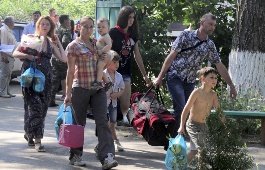Estonia, EU – Baltic States, Latvia, Legislation, Society, Transport
International Internet Magazine. Baltic States news & analytics
Friday, 13.02.2026, 00:38
Latvia and Estonia to oppose EU refugee quota system
 Print version
Print version |
|---|
Interior Minister Rihards Kozlovskis (Unity) has been ordered to prepare political arguments on why "we are not ready to accept the quota system".
Straujuma emphasized that Latvia supports solidarity regarding other measures, such as increased border control, medical aid, and other matters, but is against the quota system.
As reported, All For Latvia!-For Fatherland And Freedom/LNNK (VL-TB/LNNK) believes that the so-called refugee quotas are not applicable to Latvia.
VL-TB/LNNK will raise the question demanding that the coalition agree on a joint position that refugee quotas must not apply to Latvia.
Similar to quite a few European countries, such as Great Britain and Hungary, the Estonian Ministry of the Interior does not support the intention of the European Union to oblige all member states to share the burden of refugees with the Mediterranean countries, Postimees Online reports.
Interior Ministry Spokesman Toomas Viks pointed out that the position of Estonia that participation in resettling of refugees must be voluntary, has been expressed in recent months by nearly a half of the member states, including Great Britain, Finland, Poland, the Czech Republic, Slovakia, Hungary, Spain, Lithuania, Latvia and Romania. "In our view, this requires a broader societal debate about what the new initiative means for Estonia and what additional capabilities the Estonian state would have to create for this, including taking into account both the Vao accommodation the centre and Harku detention centre possibilities," he said.
Viks drew attention that the Estonian government approved of positions regarding possible compulsory redistribution of applicants for international protection a year ago. "Estonia is of the view that regarding the refugee policy, solidarity is not expressed only in the physical relocation and placement of people. The resettlement and relocation of refugees is only one of the possible solutions to express solidarity, but the main way is the financial and technical assistance of other member states. We consider it important to support member states under pressure of migration, but we believe that the relocation and resettlement of refugees should remain voluntary for member states," the government's position then read.
The European Commission is likely to announce the refugee quota plan details on Wednesday.
"Estonia understands the seriousness of the situation in the Mediterranean region and the need to find adequate solutions to help people. Certainly, Estonia is ready to negotiate finding these solutions at the European Union level," said Viks. He said that Estonia also supports the strengthening of Frontex operations, the fight against people-trafficking networks, financial and development cooperation with the countries of origin and helping the countries under the migratory pressure. If necessary, Estonia able to increase its contribution to Frontex operations.
The Speaker of the Estonian parliament, the Riigikogu Eiki Nestor said at the meeting of the speakers of the parliaments of the EU Member States on Monday that in solving the Mediterranean refugee crisis, Europe and the Mediterranean countries have to act promptly and plan their actions, Riigikogu press service reports.
“Migration pressure on the Mediterranean and increasing trafficking in human beings require rapid and concrete actions from Europe and the Mediterranean countries,” Nestor said. “In order to solve the situation, the Member States of the EU have to act in a coordinated way, the principles and rules have to be agreed upon.”
Nestor emphasised that close and practical cooperation of the EU with all of the Mediterranean countries is also of critical importance here.
“Estonia supports the proposal of the EU Commission to start concrete and planned actions to stabilise the situation,” the President of the Riigikogu remarked. “There may not be quick results, but if each Member state contributes according to its abilities, we would step by step get closer to a lasting solution.”
In Nestor’s opinion it is important to increase the role of the European Union border guard agency Frontex and improve the efficiency of its work. The President of the Riigikogu also thinks that it is necessary to act decisively against the criminal networks of human traffickers.
The II Summit of Speakers of Parliaments of the Parliamentary Assembly of the Union for the Mediterranean in Lisbon is dedicated to the migration pressure in the Mediterranean region. The Summit brings together the speakers of the parliaments of the European Union Member States and the Mediterranean countries of Africa and Asia.








 «The Baltic Course» Is Sold and Stays in Business!
«The Baltic Course» Is Sold and Stays in Business!

